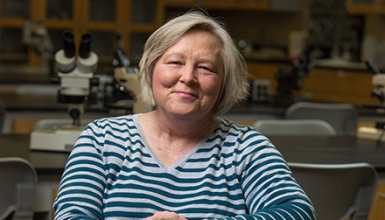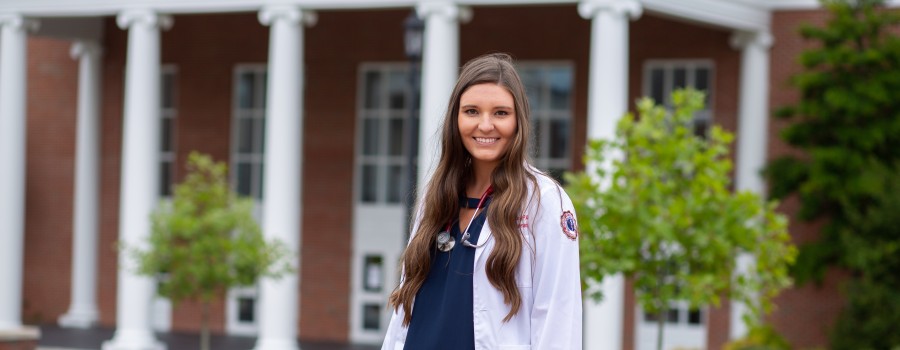Work on the front lines of healthcare to help improve your community’s health and wellbeing.
The field of healthcare offers rewarding and important work that is vital to the success of any and every community. Completing a degree in our pre-physician assistant program could be the first step you need to attain a future career dedicated to helping others. As a physician assistant, you would play a critical role in healthcare, practicing medicine alongside physicians, surgeons, and other healthcare professionals.
And if you change your mind about becoming a PA later on, don’t sweat it. This program is designed to teach you the basics about natural sciences, opening doors for you to make an impact in any scientific career you choose as you contribute to vital medical discovery and innovation in areas like clinical research and chemistry applications. By earning a degree in pre-physician assistant, you’ll be prepared to take on any number of careers.
By the Numbers
$121,530
28%
16:1
100%
Programs & Requirements
* The credit hours listed on this page only reference the specific program requirements and is not reflective of the total hours necessary to receive your degree. Cumberlands requires all students obtain a minimum of 60 hours for an associate’s degree and a total of 120 hours for a bachelor’s degree. Transfer and prior learning credits may be counted toward those totals.
To learn more about our General Education Requirements, please visit the page referenced below or explore our Academic Catalog.
Pre-Physician Assistant
Undergraduate students interested in applying for early admission to the University’s Master of Science in Physician Assistant Studies (MSPAS) program must complete the following coursework in total at the University of the Cumberlands as Pre-PA Biology majors. Additionally, students must complete all requirements of the General Education curriculum for undergraduates as outlined in the University of the Cumberlands Undergraduate catalog. Admission is made during the third year of undergraduate study. Students must complete all PA admissions requirements by time of application. Completion of the Pre-PA curriculum does not ensure acceptance into the MSPAS program.
Students who complete the Pre-Professional PA curriculum but do not continue on to the Professional phase of the PA program will need a total of 35 hours of biology courses (those listed below, plus BIOL 495 or BIOL 498, and either 6 additional hours of biology electives), 7 hours of allied science courses, and elective classes to complete the 120 hours needed to attain a Bachelor of Science with a major in biology. Alternatively, students can complete a Biology of Science degree in Independent Directions with a focus on applied health sciences. A third alternative is to complete a Bachelor of General Studies degree. Information on these alternatives may be found elsewhere in this catalog.
Students who successfully complete the pre-physician assistant curriculum and are accepted into the MSPAS program are awarded a Bachelor of Health Science degree by the University after the successful completion of the first year of didactic coursework in the MSPAS program. Students are then awarded the Master of Science in Physician Assistant Studies degree after the successful completion of the second year of coursework.
Course Requirements
- BIOL 113 - Introduction to Population Biology Laboratory
- BIOL 114 - Introduction to Cellular Biology Laboratory
- BIOL 121 - Medical Terminology
- BIOL 133 - Introduction to Population Biology
- BIOL 134 - Introduction to Cellular Biology
- BIOL 210 - Introduction of Biological Literature
- BIOL 443 - General Physiology
- BIOL 246 - Biodiversity
- BIOL 340 - Genetics
- BIOL 343 - Human Anatomy OR BIOL 442 - Comparative Anatomy *Wburg program does not accept Comparative
- BIOL 345 - Microbiology
- CHEM 111 - General Chemistry Laboratory I
- CHEM 132 - General College Chemistry I
- CHEM 211 - General Chemistry Laboratory II
- CHEM 232 - General College Chemistry II
- CHEM 321 - Organic Chemistry Laboratory I
- CHEM 331 - Organic Chemistry I
6 credits of 300 or 400 level Biology courses, 3 Credit Hours in Psychology, 3 Credit Hours in Statistics
- Genetics
- Embryology
- Biochemistry
- Immunology
- Molecular Biology
- Advanced Cell Biology
- Histology
- Parasitology
- Analytical Chemistry
- Organic Chemistry II
- Virology*
- Any upper-level Pharmacology course*
*UC doesn’t offer these courses, but we do accept them.
A Bachelor of Arts degree requires completing the same courses as a Bachelor of Science with the addition of completing one foreign language sequence through the intermediate level.
- FREN 131 Elementary French I
- FREN 132 Elementary French II
- FREN 231 Intermediate French I
- FREN 232 Intermediate French II
- SPAN 131 Elementary Spanish I
- SPAN 132 Elementary Spanish II
- SPAN 231 Intermediate Spanish I
- SPAN 232 Intermediate Spanish II
Admission to Pre-Professional Phase
Undergraduate students interested in applying for early admission into the university’s Master of Science in Physician Assistant Studies (MSPAS) program must have declared as a freshman and complete all course work as 3-2+ at UC. We do not accept transfer students into the 3-2+ pathway. View our Pre-Physician Assistant academics page for more information on that major.
Additionally, students must complete all requirements of the General Education curriculum for undergraduates as outlined in the University of the Cumberlands undergraduate academic catalog. (You can find the catalog on our website.) Admission is made during the third year of undergraduate study. Must complete all admission criteria by the time of matriculation. We allow applicants to have courses in progress at time of application. Completion of the Pre-PA curriculum does not ensure acceptance into the MSPAS program.
Students who complete the Pre-Professional PA curriculum but do not continue on to the professional phase of the PA program will need nine hours of biology, five hours of chemistry and sixteen hours of electives to complete a major in biology. Alternatively, they can complete a Biology of Science degree in Independent Directions with a focus on applied health sciences. A third alternative is to complete a Bachelor of General Studies degree. Information on these alternatives may be found elsewhere in the University of the Cumberlands’ Undergraduate catalog.
Students who successfully complete the pre-physician assistant curriculum and are accepted into the MSPAS program are awarded a Bachelor of Health Science degree by the University after the successful completion of the first year of didactic coursework in the MSPAS program. Students are then awarded the Master of Science in Physician Assistant Studies degree after the successful completion of the second year of coursework.
In addition to the admissions requirements noted above for general applicants, the following courses are required prior to application for Pre-professional students:
- BIOL 113 - Intro. to Population Biology Lab.
- BIOL 114 - Intro. to Cellular Biology Lab.
- BIOL 121 - Medical Terminology
- BIOL 133 - Intro. to Population Biology
- BIOL 134 - Intro. to Cellular Biology
- BIOL 244* - Human Physiology OR BIOL 443 - General Animal Physiology
- BIOL 246 - Biodiversity
- BIOL 340 - Genetics
- BIOL 343 - Human Anatomy
- BIOL 345 - Microbiology
- CHEM 111 - General Chemistry Lab. I
- CHEM 132 - Chemistry 1 w/ lab- 3 semester hours or more
- CHEM 211 - General College Chemistry Lab. II
- CHEM 232 - Chemistry 2 w/ lab - 3 semester hours or more
- CHEM 321 - Organic Chemistry Lab. I
- CHEM 322 - Organic Chemistry I
- Upper Level Science Electives - 6 credit hours (Select from Genetics, Embryology, Immunology, Biochemistry, Advanced Cell Biology, Molecular Biology, Histology, Parasitology, Virology, Organic Chemistry II, Analytical Chemistry, any upper level Pharmacology course)
- Psychology (3 credit hours)
- Statistics
*preferred
Take the Next Step
Mission and Goals
The goal of the pre-physician assistant degree program at Cumberlands is to offer students seeking careers as physician assistants the curriculum needed to enter a graduate program that will prepare them for positions in the field.
Physician Assistant Careers & Outcomes
All stats from U.S. Bureau of Labor Statistics
Physician Assistant: $121,530
Physician Assistant: $121,530
Physician assistants examine, diagnose, and treat patients under the supervision of a physician.
Doctor: $208,000
Doctor: $208,000
Doctors diagnose and treat injuries or illnesses and address health maintenance.
Nurse: $77,600
Nurse: $77,600
Registered nurses (RNs) provide and coordinate patient care and educate patients and the public about various health conditions.
Clinical Researcher: $95,310
Clinical Researcher: $95,310
Medical scientists conduct research aimed at improving overall human health.
Postsecondary Science Teacher: $79,640
Postsecondary Science Teacher: $79,640
Postsecondary teachers instruct students in a variety of academic subjects beyond the high school level.
Natural Sciences Manager: $137,900
Natural Sciences Manager: $137,900
Natural sciences managers supervise the work of scientists, including chemists, physicists, and biologists.
Common Questions
A pre-physician assistant program is an educational pathway designed to provide the foundational knowledge and skills needed to pursue a master's degree in physician assistant studies. It includes coursework in natural sciences and prepares students for careers in healthcare as physician assistants or related fields.
A pre-physician assistant program typically requires around 62 credit hours, which may take approximately two years to complete if pursued full-time, depending on the specific institution's requirements and course load.
The provided information does not specify if the program is available online; however, many institutions offer flexible online options for pre-professional programs. It is advisable to check with the specific university for availability.
Yes, a pre-physician assistant program can be worth it for those seeking a career in healthcare. It provides essential knowledge and skills that can lead to roles as physician assistants or in other scientific and healthcare-related fields. The program can also enhance your preparation for graduate studies.
Completing a pre-physician assistant program can lead to various career opportunities, including becoming a physician assistant, clinical researcher, postsecondary science teacher, or natural sciences manager. It also lays the groundwork for further studies in healthcare or related fields.
To enroll in a pre-physician assistant program, you typically need to apply to a college or university that offers it, meet admission requirements (which may include specific coursework or GPA), and complete the required coursework for the program.
Yes, a pre-physician assistant program is usually part of a bachelor’s degree program. Students often complete their degree while fulfilling prerequisites for applying to graduate programs in physician assistant studies.
Faculty Experts in Pre-Physician Assistant Program
Learn more about our experienced faculty in our pre-physician assistant program.

Ms. Kara Stanley

Dr. Leif Deyrup
Dr. Leif Deyrup
Contact Information

Dr. Joan Hembree
Dr. Joan Hembree
Contact Information
Request Information
Have questions? We're here to answer them!

